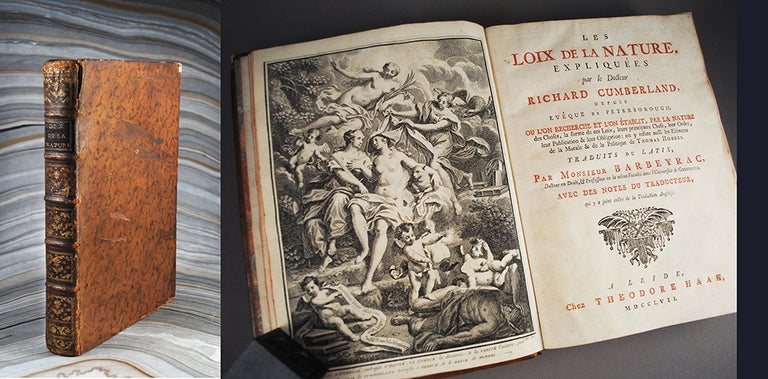
Les loix de la nature, expliqués par le Docteur Richard Cumberland...Traduits du Latin, par Monsieur Barbeyrac...Avec des notes du traducteur.
1757. Leide: Haak, 1757.
4to, [2], xxviii, [2], 435 [i.e. 425], [1, errata], [8, table des matieres] pp. Lovely emblematic engraved frontispiece, title-page in black and red. Contemporary speckled calf, backstrip richly gilt, red morocco label, edges stained red. A little worn and used with a few scuffs and cracks but quite a good copy in acceptable condition.
§ First edition under this title. The French translation of Cumberland's De legibus naturae, by the eminent French jurist, Jean Barbeyrac, with the translator's copious notes. This work originally appeared in 1744 as Traite philosophique des loix naturelles. From all indications, this is an exact reprint, with a new title. Both versions of the Barbeyrac translation are, however, uncommon. The only copy in California (which is of the 1744 publication) seems to be the one in the Berkeley Law Library. Cumberland (1631-1718), who studied medicine for a while before taking orders, was a friend and classmate of Samuel Pepys at Magdalen College, Cambridge. The present work, which first appeared in Latin in 1672, grew out of the author's opposition to Hobbes's theory of the nature of man, the nature of morality and the origin of society. Cumberland's ethical theory is summed up in his "principle of Universal Benevolence" as the one source for moral good. In this sense he may be regarded as the founder of English utilitarianism, but it is a utilitarianism distinctive from the "selfish system." Sir Isaac Newton's name was among the list of subscribers for the original publication. Barbeyrac (1674-1744) was the nephew of Charles Barbeyrac (1629-99), a physician of high reputation and a friend of Locke. He became professor of history and civil law at Lausanne in 1711 and of public law at Groningen in 1717. According to the Encyclopedia Britannica (13th edition), his fame rests chiefly on his preface and notes to his translation of Pufendorf's De Jure Naturae et Gentium. Among his own productions are De la morale des pères, a history of ancient treaties contained in the Supplement au grand corps diplomatique, and the curious Traité du jeu (1709), in which he defends the morality of games of chance. Item #106830
Price: $475.00

